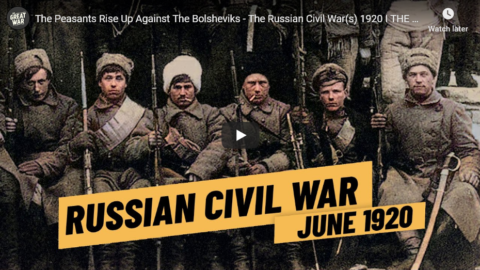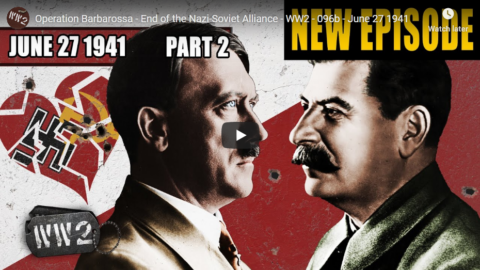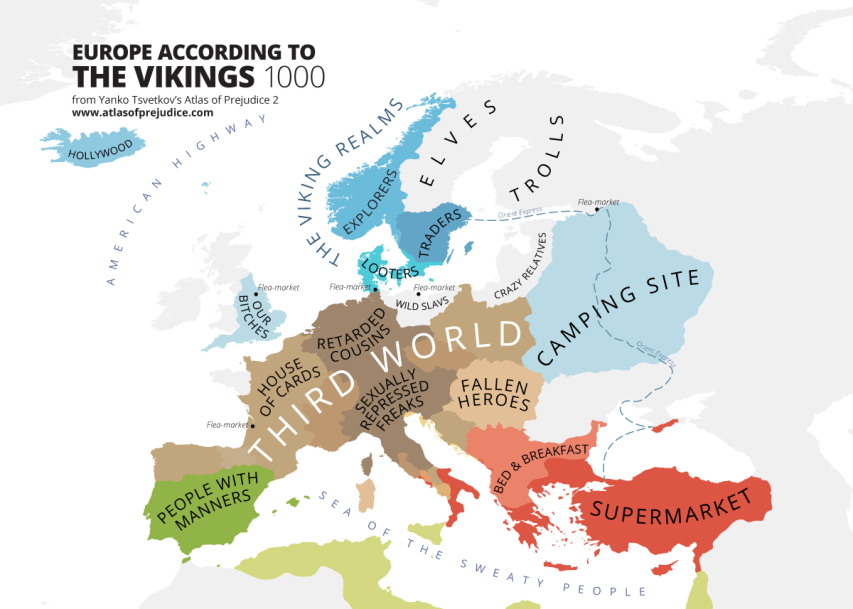The Great War
Published 27 Jun 2020Sign up for Curiosity Stream and get Nebula bundled in: https://curiositystream.com/thegreatwar
Freeing peasants and workers from oppression was one of the main messages of the Bolsheviks. The peasants in the countryside were happy to get rid of the landowning class and supported socialist ideas of land reform but once the Bolsheviks turned to “War Communism” to maintain their power against the Whites and other forces, the reluctant support of the peasants dropped — and in 1920 they turned to open revolt.
» SUPPORT THE CHANNEL
Patreon: https://www.patreon.com/thegreatwar
Merchandise: https://shop.spreadshirt.de/thegreatwar/» SOURCES
Figes, Orlando. A People’s Tragedy. The Russian Revolution (London: The Bodley Head, 2017 [1996]).
Mawdsley, Evan. The Russian Civil War (New York: Pegasus Books, 2005).
Smele, Jonathan. The “Russian” Civil Wars 1916-1926 (London: Hurst, 2015).
Sumpf, Alexandre. “Russian Civil War,” in 1914-1918 online. International Encyclopedia of the First World War. https://encyclopedia.1914-1918-online.
Engelstein, Laura. Russia in Flames (Oxford University Press, 2017).
Wolf, Eric R. Peasant Wars of the Twentieth Century (New York: Harper, 1969)» SOCIAL MEDIA
Instagram: https://instagram.com/the_great_war
Twitter: https://twitter.com/WW1_Series
Reddit: https://reddit.com/r/TheGreatWarChannel»CREDITS
Presented by: Jesse Alexander
Written by: Jesse Alexander
Director: Toni Steller & Florian Wittig
Director of Photography: Toni Steller
Sound: Toni Steller
Editing: Toni Steller
Mixing, Mastering & Sound Design: http://above-zero.com
Maps: Daniel Kogosov (https://www.patreon.com/Zalezsky)
Research by: Jesse Alexander
Fact checking: Florian WittigChannel Design: Alexander Clark
Original Logo: David van StepholdContains licensed material by getty images
All rights reserved – Real Time History GmbH 2020
June 28, 2020
The Peasants Rise Up Against The Bolsheviks – The Russian Civil War(s) 1920 I THE GREAT WAR 1920
“Viking” was the word for “Incel” in the early Middle Ages
At least, that’s one interpretation offered by Mary Harrington at UnHerd:
Last week, World War 3 nearly started in Ladakh. A dry, high-altitude region of Indian Kashmir on the Himalayan border with China, it’s been the site of escalating tensions and military buildup for some time. On June 15, the first physical confrontation between the Indian and Chinese militaries for 45 years erupted, killing at least 20 Indian and 45 Chinese soldiers.
There are all sorts of geopolitical reasons cited for the escalating tension between the world’s two most populous countries, but there is one more central and timeless problem that is going to drive both countries towards violence and instability — women. Or a lack of them.
In his History of the Normans, written circa 1015, Dudo of St Quentin argued that the reason the Vikings went raiding was because they couldn’t find wives, an idea echoed by the Tudor antiquarian William Camden in his 1610 book Britannia. “Wikings”, Camden suggested, were what you got when there weren’t enough women to go round, resulting in an excess of young men hanging around full of machismo but without any prospect of finding a nice girl and settling down. (Viking literally means raider.)
So, whenever these spare males “multiply’d themselves to a burdensom community”, Camden reports that an area would draw lots. Those of the young troublemakers chosen in the lottery would be sent off on a ship to make a nuisance of themselves overseas. Which they did.
In evolutionary biology, the “operational sex ratio” is a term used to count the proportion of males and females in a given species that are seeking a reproductive mate. As soon as the ratio tilts away from 50:50, the sex that’s over-represented will have to compete to secure a mate from among the less-plentiful potential partners of the opposite sex.
Though they wouldn’t have used that phrase, both Dudo of St Quentin and William Camden were both describing this phenomenon in human males. Where potential wives are scarce and the “burdensom community” of spare men multiplies, the result is more violence and crime. One 2019 study showed that where polygyny — that is, multiple wives — is a social norm for higher-status men, attacks on neighbouring ethnic groups skyrocket. With a few men monopolising eligible women, the rest are forced to seek status and resources by attacking other tribes.
India and China both have an extremely “burdensom community” of spare males. The normal ratio of newborn boys to girls is around 105:100. But as Mara Hvistendahl documents in Unnatural Selection, thanks to prenatal ultrasound and sex-selective abortion the ratio in China is around 118:100, and 108:100 in India. In some regions of India, the ratio rises as high as 150 males to 100 females. Though sex-selective technology is now banned in India, it’s still widespread, and the country now has some 37 million more men than women. Studies estimate that China has around 30 million excess men.
Why is the British government buying part of OneWeb?
As Tim Worstall points out, the British government’s decision to buy 20% of the satellite company OneWeb doesn’t actually make any economic sense:
… OneWeb – in which the UK will own a 20% stake following the investment – currently operates a completely different type of satellite network from that typically used to run such navigation systems.
“The fundamental starting point is, yes, we’ve bought the wrong satellites,” said Dr Bleddyn Bowen, a space policy expert at the University of Leicester. “OneWeb is working on basically the same idea as Elon Musk’s Starlink: a mega-constellation of satellites in low Earth orbit, which are used to connect people on the ground to the internet.
The actual answer is that we don’t need to buy into anyone’s system at all. Just as we shouldn’t have into [EU satellite system] Galileo in the first place.
For, d’ye see, GPS is a public good. The US allows anyone to use the signals. Not that they can really stop people doing so either. Not unless they take the whole system down.
So, there’s the US system, free for all to use. A global public good – this means it doesn’t matter who provides it, it is there. It also means we don’t need our own. Which, in turn, means we don’t and didn’t need the Galileo system, let alone another one after we’ve left that.
As I said, politics not even asking the right question. They’re asking “which new system should we have?” when the correct questions is “why do we need a new system?” and given that the answer to the second is we don’t therefore the first is entirely moot.
Even setting aside the question of what the satellite system will be capable of, as the market is already in the process of developing and deploying the equipment, why does the British government think its investment is necessary?
British 1942 Prototype Simplified…Enfield?
Forgotten Weapons
Published 18 Nov 2018https://www.forgottenweapons.com/brit…
http://www.patreon.com/ForgottenWeapons
Cool Forgotten Weapons merch! http://shop.bbtv.com/collections/forg…
In 1942, the British government instituted a development program to design a new simplified rifle to replace the No4 MkI Lee Enfield. The CSAD (Central Small Arms Department) came up with a design using a quite simple receiver machined form a small steel billet. It was a rifle wholly distinct form the Enfield, although both were chambered for the .303 British cartridge. The simplified rifle used a front-locking bolt, a simplified cocking piece, and had a magazine holding just 6 rounds. The sights were a simple 300/600 yard rear aperture, and a crude spike bayonet could be fitted either forward for use or rearward for storage.
The project never got as far as serial production, or even field trials as far as I can tell, and only a handful of prototypes were made.
Contact:
Forgotten Weapons
PO Box 87647
Tucson, AZ 85754
QotD: Nietzsche’s views on Christianity
Nietzsche was a devastating critic of dogmatic Christianity — Christianity as it was instantiated in institutions. Although, he is a very paradoxical thinker. One of the things Nietzsche said was that he didn’t believe the scientific revolution would have ever got off the ground if it hadn’t been for Christianity and, more specifically, for Catholicism. He believed that, over the course of a thousand years, the European mind had to train itself to interpret everything that was known within a single coherent framework — coherent if you accept the initial axioms. Nietzsche believed that the Catholicization of the phenomena of life and history produced the kind of mind that was then capable of transcending its dogmatic foundations and concentrating on something else. In this particular case it happened to be the natural world.
Nietzsche believed that Christianity died of its own hand, and that it spent a very long time trying to attune people to the necessity of the truth, absent the corruption and all that — that’s always part of any human endeavour. The truth, the spirit of truth, that was developed by Christianity turned on the roots of Christianity. Everyone woke up and said, or thought, something like, how is it that we came to believe any of this? It’s like waking up one day and noting that you really don’t know why you put a Christmas tree up, but you’ve been doing it for a long time and that’s what people do. There are reasons Christmas trees came about. The ritual lasts long after the reasons have been forgotten.
Nietzsche was a critic of Christianity and also a champion of its disciplinary capacity. The other thing that Nietzsche believed was that it was not possible to be free unless you had been a slave. By that he meant that you don’t go from childhood to full-fledged adult individuality; you go from child to a state of discipline, which you might think is akin to self-imposed slavery. That would be the best scenario, where you have to discipline yourself to become something specific before you might be able to reattain the generality you had as a child. He believed that Christianity had played that role for Western civilization. But, in the late 1800s, he announced that God was dead. You often hear of that as something triumphant but for Nietzsche it wasn’t. He was too nuanced a thinker to be that simpleminded. Nietzsche understood — and this is something I’m going to try to make clear — that there’s a very large amount that we don’t know about the structure of experience, that we don’t know about reality, and we have our articulated representations of the world. Outside of that there are things we know absolutely nothing about. There’s a buffer between them, and those are things we sort of know something about. But we don’t know them in an articulated way.
Jordan B. Peterson, “Biblical Series I: Introduction to the Idea of God” {transcript], jordanbpeterson.com, 2018-03-12.








